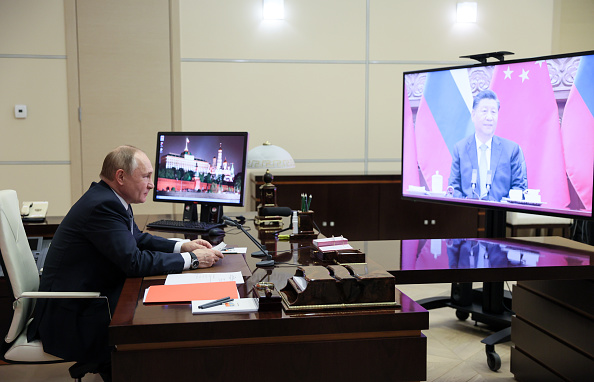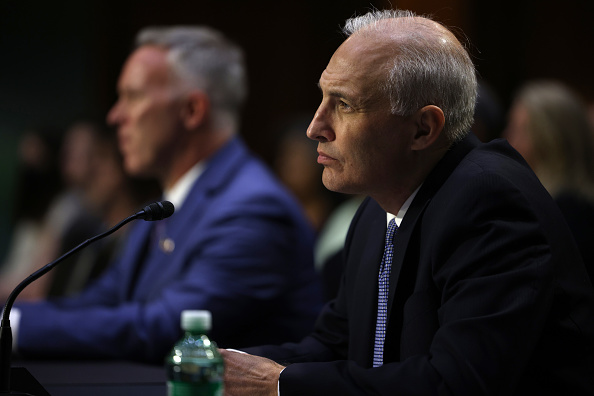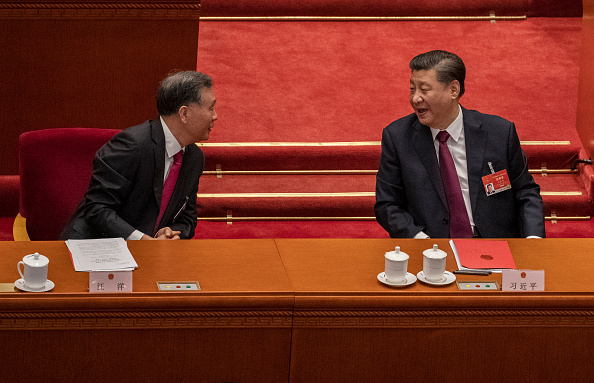
 A Sovereign Tightrope
A Sovereign TightropeRussian forces have attacked cities across Ukraine.While the U.S. and EU have taken swift action against Russia, the Chinese government has declined to label it as an invasion, instead calling it "Russia's operation." Beijing has called for restraint and a de-escalation through dialogue, but has otherwise been careful not to criticize Russia, even calling the U.S. the "culprit of current tensions."
On Friday, Beijing appeared to take some limited action against Russia by reportedly having state banks restrict some financing for Russian commodities, as it seemingly tries to walk a fine line between supporting Moscow and adhering to its long-standing policies on the protection of territorial sovereignty. And after a call today between Vladimir Putin and Xi Jinping, the Russian head of state said he is ready to send a delegation to meet with representatives from Ukraine, expressing some openness to dialogue.
During an in-person meeting earlier this month, Vladimir Putin and Xi Jinping declared there are "no limits" to the friendship between China and Russia. However, the current events will challenge Chinese foreign policy, which has always upheld that non-interference in other countries' affairs is a core principle.
Ukraine's number one trading partner is China, and international experts believe Beijing would prefer stability in its relations with Kiev, but that this could be difficult to sustain when it is so closely aligned with Russia.
The Biden administration, which has denounced the invasion as "an unprovoked and unjustified attack" now must weigh its next steps, with sanctions directly on Putin widely anticipated. As the world trains its eyes on Ukraine, the crisis is being closely watched in Taiwan,, where the Biden administration believes China could see the U.S. response to the Ukraine crisis as a roadmap for "reunification" with Taiwan.
Read more in "Three Mirrors on Ukraine," by Han Liqun, a Researcher at the China Institutes of Contemporary International Relations.
 End of a Myopic Focus
End of a Myopic FocusThe U.S. Justice Department has ended a controversial program focused on fighting Chinese espionage and intellectual property theft, shifting from what an official called a "myopic" focus to address threats from a broader array of hostile nations.
"We see nations such as China, Russia, Iran and North Korea becoming more aggressive and more capable in their nefarious activity than ever before," said Matt Olsen, the Assistant Attorney General for the National Security Division. "Our new strategy is threat-driven."
The so-called "China Initiative" was launched in 2018 by the Trump administration and spearheaded by former U.S. Attorney General Jeff Sessions. It intended to counter what the department said were "Chinese national security threats," however it has been widely criticized as racial profiling that unfairly painted Chinese Americans and U.S. residents of Chinese origin as disloyal.
However, the Biden administration is adamant that it will continue to crack down on what it characterizes as determined and nefarious efforts by the Chinese government to acquire high-tech secrets by illegal means and to intimidate dissidents and critics abroad.
"The Department of Justice is going to continue to aggressively combat threats posed by the PRC government using investigations, prosecutions, the full range of tools at our disposal. I think our actions will speak for themselves," said Olsen.
 Setting the Agenda
Setting the AgendaThe Winter Olympics came to a close in Beijing on Sunday, and all eyes are now on China's upcoming 'Two Sessions' meetings that begin next week. The annual parliamentary gatherings will set policy plans for the next year regarding the economy, trade, the environment, and more.
This year's meetings will touch on a myriad of topics, including GDP and regulation, foreign relations, Taiwan, and unemployment. China's zero-Covid policy will also be a topic of discussion as the Covid-19 pandemic continues into the third year, and the session will serve as an important window to see if any changes will be made to China's approach. Suggestions on the protection of women's rights will also likely be brought to the table, following a domestic women's rights case that caused public outrage in China and led to the termination of seventeen local officials. And while China's population maintained growth last year, the number of births dropped for the fifth consecutive year. Additional policies regarding birth restrictions and China's retirement age are anticipated at the sessions.
As the meetings approach, policymakers have also used this time as an opportunity to look back at the actions taken over the last year that stemmed from the previous 'Two Sessions', according to state-run news outlet Xinhua News. Some of the work accomplished includes increased protection of workers' rights and the reduction of pressure on schoolchildren, both hot topics at the 2021 gatherings.
Take a look back at last year's 'Two Sessions' in "What the World Sees in Two Sessions," by Chen Jimin, a Guest Researcher at the Center for Peace and Development Studies.
Prepared by China-US Focus editorial teams in Hong Kong and New York, this weekly newsletter offers you snap shots of latest trends and developments emerging from China every week, while adding a dose of historical perspective.
- 2022-02-18 Strategic Disengagement
- 2022-02-11 In the Thick of It
- 2022-02-04 Year of the Tiger
- 2022-01-28 Zero-Sum
- 2022-01-21 An Uncertain Future
- 2022-01-14 Digital Advances
- 2022-01-07 The Dawn of a New Political Year
- 2021-12-17 Clamp Down
- 2021-12-10 Debating Democracy
- 2021-12-03 Managing Competition
- 2021-11-19 Responsible World Leadership
- 2021-11-12 A Historic Transformation
- 2021-11-05 A Green Rivalry
- 2021-10-29 Dry Tinder
- 2021-10-22 A Diplomatic Burn
- 2021-10-15 Energy Crunch
- 2021-10-08 Stoking Tensions
- 2021-10-01 Great Power Coopetition